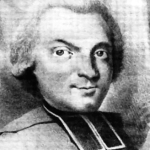 Jacques Roux (1752-1794) was a radical priest turned revolutionary activist, best known as the most outspoken member of the enragés. Born in the Charante in south western France, Roux was the son of a military officer. Roux was educated in a seminary, ordained in 1782 and spent most of the 1780s working in parishes. During this time, Roux gained a reputation as a radical firebrand, who preached economic equality and divine retribution against those who exploited the poor. Roux fled his parish in 1789 after being accused of inciting peasant unrest. He moved to Paris, took the constitutional oath and became active in the sections and the Cordelier Club. Roux joined the radical Paris Commune in late 1792 and, in January 1793, was appointed to accompany Louis XVI to his execution. In the first half of 1793, Roux became the most visible member of the enragés, a group of Paris radicals who demanded price controls and a crackdown on grain hoarding and monopolies. His most significant act was a June 1793 speech before the National Convention, later dubbed the ‘Manifesto of the Enragés‘, where he urged the Montagnard deputies to take action against “the bloodsuckers of the people”. This attempt to further radicalise the Convention made Roux a target for Maximilien Robespierre and the Jacobins, who began to denounce him. Conspirators orchestrated Roux’s arrest in August 1793 and he remained in prison until his suicide in February 1794.
Jacques Roux (1752-1794) was a radical priest turned revolutionary activist, best known as the most outspoken member of the enragés. Born in the Charante in south western France, Roux was the son of a military officer. Roux was educated in a seminary, ordained in 1782 and spent most of the 1780s working in parishes. During this time, Roux gained a reputation as a radical firebrand, who preached economic equality and divine retribution against those who exploited the poor. Roux fled his parish in 1789 after being accused of inciting peasant unrest. He moved to Paris, took the constitutional oath and became active in the sections and the Cordelier Club. Roux joined the radical Paris Commune in late 1792 and, in January 1793, was appointed to accompany Louis XVI to his execution. In the first half of 1793, Roux became the most visible member of the enragés, a group of Paris radicals who demanded price controls and a crackdown on grain hoarding and monopolies. His most significant act was a June 1793 speech before the National Convention, later dubbed the ‘Manifesto of the Enragés‘, where he urged the Montagnard deputies to take action against “the bloodsuckers of the people”. This attempt to further radicalise the Convention made Roux a target for Maximilien Robespierre and the Jacobins, who began to denounce him. Conspirators orchestrated Roux’s arrest in August 1793 and he remained in prison until his suicide in February 1794.
Information and resources on this page are © Alpha History 2018. Content on this page may not be copied, republished or redistributed without the express permission of Alpha History. For more information please refer to our Terms of Use.
